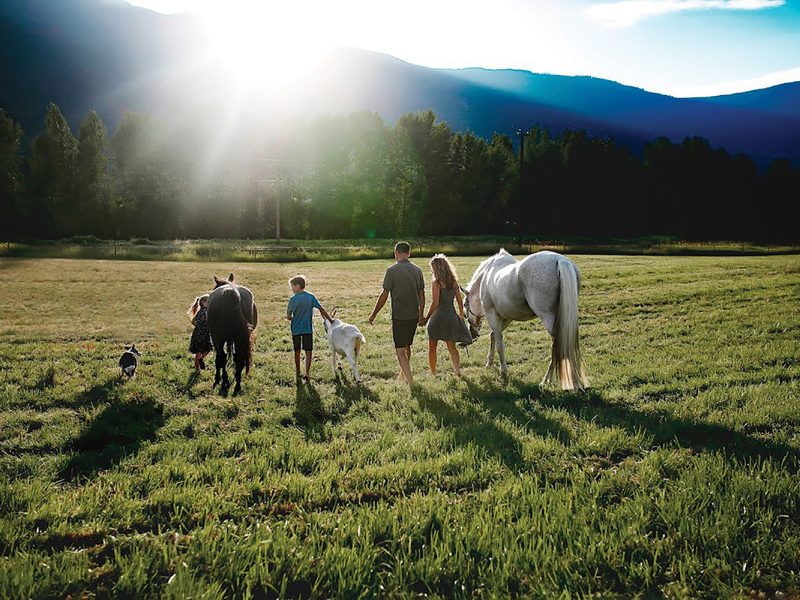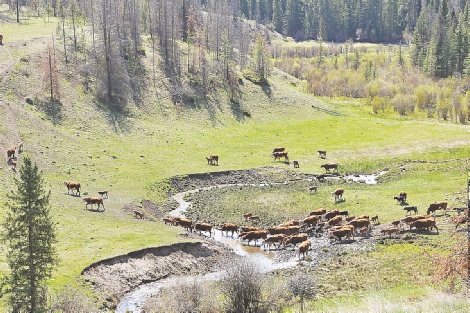SALMON ARM – Although causes and organizations have tried to encourage producers to speak up about their mental health over the past decade, reservations remain.
While 65 farmers accessed no-cost counselling in English, Spanish and Punjabi during the last growing season that AgSafe BC makes stats available, producers still need to be convinced to reach out.
During a free online presentation Farm Credit Canada hosted November 21, executive leadership coach Dale Curd pointed out that agriculture has yet to fully normalize mental wellness the way law enforcement and other sectors have.
“We have tried isolation, and ‘suck it up buttercup’, and ‘just get off the farm’ without much success, so let’s try doing something different,” he said.
Merel Voth agrees. She and husband Barrie sold everything, including their home in Enderby, to start Hillside Dreams Goat Dairy in May 2014 on leased land near Salmon Arm. The outlook for goat milk was positive and Barrie had passion plus significant cattle and goat dairy experience. In five years, their business expanded to a milking herd of 160, selling breeding stock across Canada, plus goat compost sales.
In 2019, with help from a private investor and FCC, they bought the farm.
But in 2022, after much deliberation and counselling, they made the difficult decision to close the dairy due to rising costs and the failure of sales – both the volume sold and price received – to keep up.
But the toll on their mental wellbeing was also key.
“The healing will take time,” says Voth.
Although she works as a professional counsellor, she says talking openly about their situation is very difficult.
“The pressures we have faced at times have driven us to our greatest opportunities for learning but at times it felt so lonely and discouraging. I found it difficult to be in a constant state where we are required to create, regenerate, innovate, market … It’s hard to be creative when you’re really stressed out,” says Voth adding, “I am so grateful to be married to a partner who was willing to hear me say ‘let’s stop before this breaks us.’”
Many farmers don’t allow themselves the same vulnerability.
“Taking problems outside of the family is often not okay,” she says. “In other groups, everyone has a therapist and is proud about it. In the farming community, there’s still so much stereotyping and shame.”
While farmers are hailed as feeding the world, she wonders how farmers can find support.
“If I see a farmer that’s in huge stress around finances, I can provide resources, which maybe changes the way they conceptualize it, but I can’t change the interest rate,” she says. “I can’t change the reality that you may need to sell the farm or consider working off the farm.”
She wonders if helping people cope ignores the mounting expectations of farmers to provide cheap, safe food as the cost of land and equipment that makes it all possible continues to rise. Meanwhile, they’re held to a high standard of land stewardship, expected to be sustainable while at the same time vilified – especially livestock farmers – for contributing to climate change.
“Someone commented last week how wonderful it must be for second, third and fourth-generation farmers, the wealth they’ve acquired and the opportunity to join their family farming enterprises,” says Voth. “I see it differently. There are high expectations of maintaining standards and traditions of farming practices. There are definite power differentials between generations, and too often the younger people lack autonomy to decide how they want to live and how they want to earn money.”
Feeling trapped
She says farmers often feel trapped, unable to easily talk about their situation or their feelings because they don’t want to throw family members under the bus.
Voth says one of things she’s had to let go is her belief that if you want something badly enough, it’ll happen if you just work hard, work smart, and look for opportunities.
“There’s shame, judgement and blame around thinking about letting go of the farm, trying to make the right choice, especially multi-generational farms. It can impact a person’s sense of identity, their self-confidence, and their mental and physical state,” says Voth, adding that there is very little wiggle room for mistakes in today’s farm economy.
Curd said farmers are very resilient but that often means a fixed mindset or stubbornness to see their own challenges, or to change. He added that seeking help with mental, physical or emotional challenges is scary because people often sense their own vulnerability.
One thing healthy people in agriculture can do is model positive behaviour when it comes to dealing with emotions.
“The more aware we can become about what’s going on, what’s inside our heads – our mood – the more choice we have about what we do about that,” said Curd.
AgSafe BC executive director Wendy Bennett says the number of people accessing through her organization’s program is growing, and she hopes the free service removes a barrier to accessing care.
The one barrier AgSafe can’t eliminate is the time commitment mental wellness requires.
“Everyone needs to recognize that taking time to care for your mental health is an investment in your future and not a cost that removes other opportunities,” she says. “Seeking support before challenges arise can mean the difference between managing a challenge or having that challenge become a crisis.”


 Abbotsford awaits flood funding
Abbotsford awaits flood funding